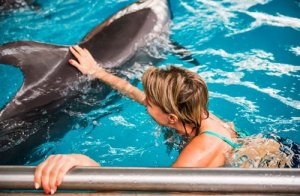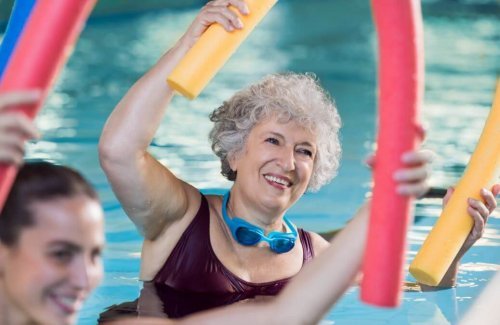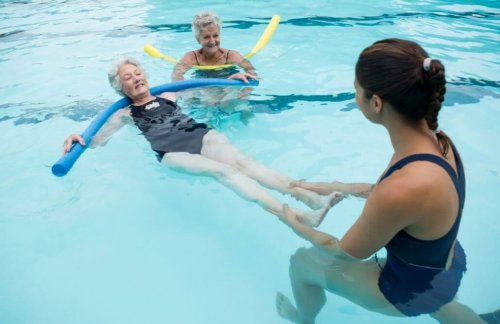Can Adults Learn to Swim?

Many adults who can’t swim believe that it may be too late, when it comes to learning something new.
You might often hear people say, “I don’t know how to swim!” And they say this, even though they are aware of all the great benefits that swimming has to offer adults. You can almost hear the resignation in their voice, as if that ship has already sailed. But, how true is this? Can adults learn to swim?
While it’s true that it’s best to learn a new discipline from a young age; when motor skills are still developing and the brain is prone to absorbing new knowledge, there’s no reason why you can’t start now.
Can adults learn to swim?

Firstly, you’ll need to stop feeling ashamed of not knowing how to swim. In fact, there are many people who won’t enrol in swimming lessons, just to save themselves from embarrassment.
This shouldn’t be the case! You are not alone, there are many adults who can’t swim. We can’t all be good at everything. You should remind yourself of this if you’re feeling uncomfortable.
As a result, you’ll have to take the plunge and sign up for classes. Once you do this, you should consider four points that you’ll need to follow:
- Be consistent and reach your goal of learning to swim.
- Follow through with how many days and hours of training you’ll do – no excuses!
- Be enthusiastic and enjoy the learning process with its progress and setbacks. Socialize and create cooperative relationships with other students and your coach.
- Set aside any fears and aversion to water that you might have.
Taking swimming classes
To begin, you’ll have to learn other types of movements, such as floating and controlling your breathing. Humans can float since their body density is less than that of water. However, it’s not always easy to do.
To learn how, follow these six steps:
- Stand in a shallow part of the pool.
- Take a breath in, and hold it.
- Tilt your body forwards, until you dip half of your head in the water.
- With a kick, raise your legs until your body is stretched out behind you.
- Keep your back straight and push, with your abs facing down.
- Relax and exhale slowly.
This last point is essential to being able to float. Stiffening your body to hold yourself afloat is useless; rather, you should relax and let the water do all of the work.
The basics of swimming
Usually, in the first days after the initial conditioning, the coach will try to develop the basic concepts that are behind a beginner’s technique. This specifically involves using a board to practice your stroke and kicks.
Another activity that your coach might suggest, involves getting to know your environment. Through games and by walking in the pool, it will make everyone feel comfortable in the water. If you think you’ve already passed this stage, you should still participate, to help others.
To feel more secure, you can stay at the side of the pool. Maybe the center may make you feel vulnerable? If so, this could undermine your self-confidence and distract you.
Read up on:

The crawl, backstroke, or butterfly technique?
Once you’ve reached the above objectives and have mastered your skills, you can gradually begin to practice the simplest technique, which is the crawl. You probably hoped that you’d be swimming like Michael Phelps within two to three weeks? Sorry, this is not how it works!
Rather, as you acquire basic skills, you’ll feel encouraged to practice on your own. However, we recommend, that you always have someone nearby – and, of course, also a lifeguard – to help you in case of an emergency. No one is completely safe from cramping and possibly needing help.
It might go without saying, but it’s important that you don’t go where your feet don’t touch the bottom of the pool. Furthermore, don’t go on your own to the beach to swim–under any circumstances. You’re a beginner: don’t underestimate the dangers of open water and deep pools.
Finally, as with many things in life, it’s important to set realistic goals. Otherwise, you’ll only disappoint yourself and frustrate your brave decision to learn to swim as an adult. Just relax and grab this challenge with both hands! So, now you know how to answer when someone asks: Can adults learn to swim?
Many adults who can’t swim believe that it may be too late, when it comes to learning something new.
You might often hear people say, “I don’t know how to swim!” And they say this, even though they are aware of all the great benefits that swimming has to offer adults. You can almost hear the resignation in their voice, as if that ship has already sailed. But, how true is this? Can adults learn to swim?
While it’s true that it’s best to learn a new discipline from a young age; when motor skills are still developing and the brain is prone to absorbing new knowledge, there’s no reason why you can’t start now.
Can adults learn to swim?

Firstly, you’ll need to stop feeling ashamed of not knowing how to swim. In fact, there are many people who won’t enrol in swimming lessons, just to save themselves from embarrassment.
This shouldn’t be the case! You are not alone, there are many adults who can’t swim. We can’t all be good at everything. You should remind yourself of this if you’re feeling uncomfortable.
As a result, you’ll have to take the plunge and sign up for classes. Once you do this, you should consider four points that you’ll need to follow:
- Be consistent and reach your goal of learning to swim.
- Follow through with how many days and hours of training you’ll do – no excuses!
- Be enthusiastic and enjoy the learning process with its progress and setbacks. Socialize and create cooperative relationships with other students and your coach.
- Set aside any fears and aversion to water that you might have.
Taking swimming classes
To begin, you’ll have to learn other types of movements, such as floating and controlling your breathing. Humans can float since their body density is less than that of water. However, it’s not always easy to do.
To learn how, follow these six steps:
- Stand in a shallow part of the pool.
- Take a breath in, and hold it.
- Tilt your body forwards, until you dip half of your head in the water.
- With a kick, raise your legs until your body is stretched out behind you.
- Keep your back straight and push, with your abs facing down.
- Relax and exhale slowly.
This last point is essential to being able to float. Stiffening your body to hold yourself afloat is useless; rather, you should relax and let the water do all of the work.
The basics of swimming
Usually, in the first days after the initial conditioning, the coach will try to develop the basic concepts that are behind a beginner’s technique. This specifically involves using a board to practice your stroke and kicks.
Another activity that your coach might suggest, involves getting to know your environment. Through games and by walking in the pool, it will make everyone feel comfortable in the water. If you think you’ve already passed this stage, you should still participate, to help others.
To feel more secure, you can stay at the side of the pool. Maybe the center may make you feel vulnerable? If so, this could undermine your self-confidence and distract you.
Read up on:

The crawl, backstroke, or butterfly technique?
Once you’ve reached the above objectives and have mastered your skills, you can gradually begin to practice the simplest technique, which is the crawl. You probably hoped that you’d be swimming like Michael Phelps within two to three weeks? Sorry, this is not how it works!
Rather, as you acquire basic skills, you’ll feel encouraged to practice on your own. However, we recommend, that you always have someone nearby – and, of course, also a lifeguard – to help you in case of an emergency. No one is completely safe from cramping and possibly needing help.
It might go without saying, but it’s important that you don’t go where your feet don’t touch the bottom of the pool. Furthermore, don’t go on your own to the beach to swim–under any circumstances. You’re a beginner: don’t underestimate the dangers of open water and deep pools.
Finally, as with many things in life, it’s important to set realistic goals. Otherwise, you’ll only disappoint yourself and frustrate your brave decision to learn to swim as an adult. Just relax and grab this challenge with both hands! So, now you know how to answer when someone asks: Can adults learn to swim?
This text is provided for informational purposes only and does not replace consultation with a professional. If in doubt, consult your specialist.








